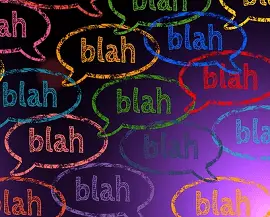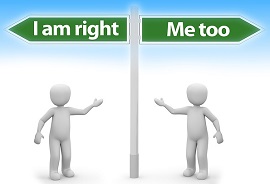- Home
- Better Memory
- Memory Systems
- Cultivate Listening
Concentration Tip #7: Cultivate Listening Over Speaking
Most people are talkers. Learn to be a good listener, an active listener. This strengthens concentration. Focus your attention on understanding the other person's point of view.
Keep reading below for my tips on how to master this skill. Build your power of concentration through better listening.
A common error during social interactions is self-absorption with one's own agenda. We tend to be more interested in what we have to say next, at the expense of not listening now.
Hold your attention on the person's words until you understand them. Only then take your turn to speak. This requires patience and self-control, which you can develop through practice.
Work to sustain your attention on what the other person is saying. True, you have points to make. Rest them in the back of your mind while the other person is talking.
Seek first to understand, then to be understood.
Stephen Covey
I visualize this as a 1/3 to 2/3 split. That's the ratio into which I divide my mental energy, between what I want to say and my intention to listen.
One third of my brain holds my message in quiet stillness; the other two thirds engages in active listening. It's a mental juggling act, performed with skill.
When I am not talking, my goal is to position the bulk of my awareness in the forefront of my mind, on listening.
Talk Less, Listen More
Not everything that passes through your mind is worth saying. No offense intended. It's just a fact.
If you want to improve your concentration, say less. Listen more. Let go the need to express every thought. This is calming, actually.
We have two ears and one mouth so that we can listen twice as much as we speak.
Epictetus, c. 108 AD
Your mind is bathed in an unending stream of thought. This is natural. So is mine. There is precious little mental silence at any time.

Concentrate on expressing
only valuable thoughts
Most thoughts have no value. Random thoughts, regrets about the past, worries of the future consume us. Rather than spew them out, just let them go.
The average person lacks conscious awareness of this babbling brook. Over and over, they tumble in and are swept way.
Indeed, one goal of focused meditation is training the mind to first notice and then let go most thoughts. Watch thoughts arise, but don't follow.
So choose what you say with care. Don't blabber for the sake of talking without rhyme or value or purpose.
Don't concern yourself if an "awkwared silence" develops. Better that than triteness or banality. Outward silence is fine; utter only the good stuff.
I listen a lot and talk less. You can’t learn anything while you’re talking.
Bing Crosby
Be considerate. Grace whomever is speaking with your focused attention. Speak less, hear more.
You benefit from this more than they do anyway. Your knowledge grows, you earn respect, your mind strengthens.
When It's Your Turn, Talk Slower
Some people need to slow down when talking. Do you know anyone like that? Are you one of them?

Speak with deliberation
A rushed verbal interaction leads to a shallow outcome most of the time. Rarely are profound insights or useful learning the result of fast-paced interchange.
Rapid speech is anathema to concentration, deep thought, or understanding. Cultivate slower, considered speech. Few wise men or women are chatterboxes.
I heard the fastest talking in my life at a PhD confirmation lecture years ago. The candidate wished to convey a great deal of technical information to the audience in a short time.
This he did, rapid-fire with nary a pause for breath. It was an impressive display, although we in the audience comprehended nothing.
The purpose of talking and listening is communication. Both ends require concentration. Focus your mind, and pace your speech. To increase understanding, present difficult material slower.
Ask Questions & Rephrase

Cultivate Listening
Strengthen your ability to listen by asking questions and rephrasing the speaker's points. This proves you are listening and understanding. Or it reveals they need to clarify.
Don't overdo it or disrupt. Be thoughtful and smooth and polite. Be mindful of the flow of conversation. The idea is to enhance the exchange of ideas.
This may lengthen the conversation. But consider which is the better outcome:
A quick exchange that leaves both with an incomplete picture of the other's point of view? Or one a bit longer that results in mutual respect and understanding?
Final Thoughts
Concentration is the flashlight of your mind. Point, and it illuminates. This is how we see and learn. It is a true power!
A weak battery renders any flashlight useless. In a similar way, poor concentration sabotages your ability to learn and remember.
Develop concentration in all areas of your life. In particular, pour mental energy into active listening during conversations. When it is your turn to talk, focus on clear and measured delivery.
Effective communication requires effort. You can develop this by practicing at every opportunity. Avoid sloppiness and lack of awareness during conversations.
Hone these skills. Your ability to concentrate during interpersonal interactions, and to concentrate generally, will skyrocket.
Published: 08/15/2016
Last Updated: 06/11/2020

Newest / Popular
Multiplayer
Board Games
Card & Tile
Concentration
Math / Memory
Puzzles A-M
Puzzles N-Z
Time Mgmt
Word Games
- Retro Flash -
Also:
Bubble Pop
• Solitaire
• Tetris
Checkers
• Mahjong Tiles
•Typing
No sign-up or log-in needed. Just go to a game page and start playing! ![]()
Free Printable Puzzles:
Sudoku • Crosswords • Word Search

Hippocampus? Encoding? Spaced repetition?
Look up memory or brain terms in the A-Z glossary of definitions.






